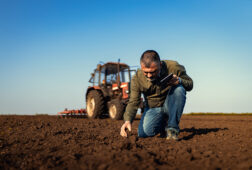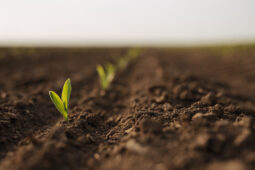Across the US and Canada, farmers are feeling the effects of a difficult season. A new article in CropLife details how difficult conditions could mean a boom for biologicals. Read the article here or get our key insights below.
Tough Year in Agriculture
Late planting, heavy rains, severe weather – growers in North America have been dealt a lot of uncertainty this season. The result?
Many are looking beyond traditional approaches to protect their yields. According to CropLife, harvests will be missing projections this year. Early frosts will likely lead to lower quality and quantity of crops, driving up prices. Higher market prices could mean higher budgets for fertility inputs, and that’s where biologicals come in.
For biologicals to work for growers, though, they must be able to increase yields without significantly changing management practices or increasing costs. Historically, this has been a challenge. Many solutions have been proposed, but one stands out as ideal: coat biology directly onto the fertilizers that growers are already using.
Currently, BiOWiSH® Crop Liquid is the first and only biological solution that can maintain stability and efficacy when coated onto fertilizer. That makes BiOWiSH® coated fertilizer a promising EEF that can address many of the problems of earlier biological technologies.
The Problems and Promises of Biologicals
CropLife names education as one of the biggest concerns in the biological industry. Earlier stages of biologicals got the reputation of “bugs in a jug” – products hyped up without the research and understanding required to ensure they will work. As a result, growers have become skeptical.
Regulations are another concern. Regulatory definitions are being debated right now, as well as how these products will be regulated and at what level. Right now, hundreds of products could be classified as biologicals – everything from predatory insects to plant extracts to live organisms. How do growers know which products to trust? How do they know what will work in their fields? Regulators and growers alike are seeking answers to these questions in science.
Fortunately, our understanding of these types of products has come a long way. Extensive new research is being published, and the techniques to study biologicals are improving all the time. BiOWiSH Technologies is adding to the growing body of research. We have conducted thousands of trials to ensure efficacy across a wide range of conditions, with more to come (check out our resources section to review some of our extensive research). We have evidence that our products work in different climates, management practices, and environments. The next step is to continue to educate growers on what options will be the best fit for them.
As growers are becoming increasingly concerned about soil productivity, biologicals offer big promise. Soil that has been flooded or saturated this season will need to be rebuilt, and the right biological solution can offer productive soil.
BiOWiSH Offers Innovative and Sustainable Solutions that Work
BiOWiSH® Crop Technology one way to build more productive soil – it works by shifting the soil microbiome, helping beneficial microorganisms to flourish. And that’s not all. BiOWiSH® microorganisms form endophytic associations with root tissue, increasing nutrient uptake and root mass. The result is higher yields, in addition to more productive soil.
Best of all, BiOWiSH® Crop Liquid can be coated right onto the fertilizer growers are already using, eliminating the need for extra infrastructure or separate application steps. If growers are using liquid fertilizer, BiOWiSH® Crop Liquid can be mixed right into that, too. As growers seek innovative solutions, BiOWiSH has the winning combination – simple, easy, and effective.
Are you curious about how BiOWiSH can help protect your next yield? Email us at agronomy@biowishtech.com or click the button below to get in touch with one of our agronomists today!





